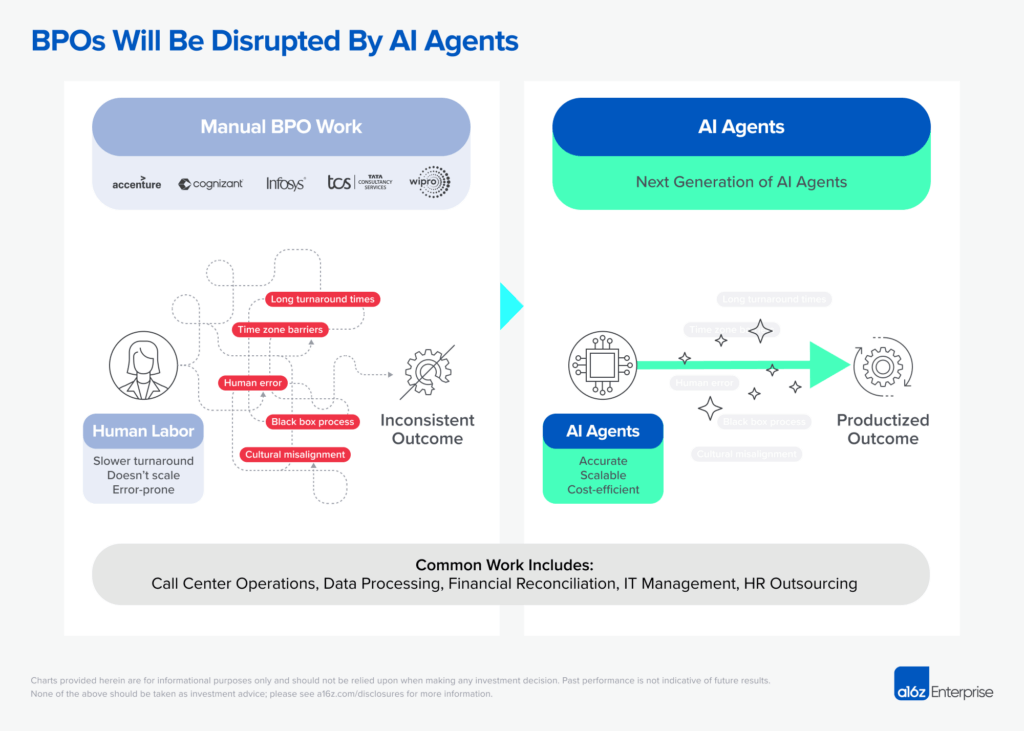How Agentic AI is Redefining the Future of the BPO Industry
Why AI-First Companies Will Replace Traditional BPOs
The BPO industry is transforming. What was once dominated by large offshore teams handling repetitive tasks is now shifting to autonomous AI-driven systems that operate 24/7, scale instantly, and think intelligently.
This isn’t just about automation. It’s about Agentic AI - AI that doesn’t just follow scripts but makes real decisions, learns from past interactions, and integrates seamlessly across systems.
Businesses outsourcing customer service, operations, and compliance are waking up to a new reality: AI doesn’t just cut costs - it makes entirely new capabilities possible.
Companies that embrace this shift will dominate. Those that don’t will struggle to keep up.
AI is Unbundling the BPO Model
For decades, BPOs were the only viable option for enterprises looking to offload high-volume, low-value tasks. This worked because:
Labor arbitrage made offshoring cost-effective.
Large teams could handle repetitive work like customer service, claims processing, and data entry.
Companies lacked the in-house capability to manage these functions efficiently.
That model is collapsing.
AI is making it possible for companies to bring outsourced functions back in-house—with better efficiency, lower costs, and far greater scale. Enterprises are realizing that instead of paying BPOs for offshore labor, they can use AI agents that:
Handle end-to-end issue resolution without human intervention.
Learn and improve continuously based on feedback.
Seamlessly integrate with CRMs, ERPs, and financial systems.
This isn’t a distant future. It’s already happening.
The New Competitive Advantage: Intelligence Arbitrage
The traditional BPO model relied on cost arbitrage - hiring teams offshore to complete tasks at a lower cost than in-house employees.
AI changes the equation. Instead of relying on human labor, businesses can now leverage intelligence arbitrage, where AI:
Works around the clock, eliminating time zone constraints.
Handles higher complexity than traditional software automation.
Provides consistent quality without the variability of human error.
BPO isn’t about labor arbitrage anymore. It’s about intelligence arbitrage. The companies that recognize this shift will redefine their industries.
The Core Advantages of Agentic AI in BPO
1. Hyper-Personalized Customer Interactions
Traditional BPO models relied on generic scripts that often failed to address real customer needs.
Agentic AI changes that by offering context-aware, dynamic conversations at scale.
Examples:
A travel company suggests vacation packages based on past bookings and browsing behavior.
A healthcare provider automatically reminds patients about prescriptions based on medical records.
The result:
Companies using AI-driven personalization see a 20% increase in customer satisfaction.
AI-powered upselling drives a 15% boost in revenue.
Instead of just answering questions, the next generation of BPO anticipates needs.
2. 24/7 Global Support Without the Overhead
AI eliminates time zones, language barriers, and staffing challenges.
What changes?
Real-time translation across 100+ languages without hiring multilingual teams.
Instant scalability for demand spikes (e.g., Black Friday, holiday travel).
A McKinsey study found that AI-driven BPO services resolve customer inquiries 40% faster than human teams. Faster resolutions mean happier customers and lower costs.
3. Smarter Compliance & Fraud Detection
Regulatory compliance is one of the biggest challenges for BPOs. AI makes compliance effortless.
How?
Automatically redacts sensitive customer data to ensure compliance with GDPR, HIPAA, and similar regulations.
Detects fraudulent patterns (e.g., duplicate refund requests, unusual transactions).
Example:
A financial services company using AI fraud detection reduced fraud-related losses by 62%.
For industries handling sensitive information, AI isn’t optional—it’s necessary.
The Role of Human Agents is Evolving
AI isn’t eliminating jobs - it’s transforming them.
New roles are emerging in AI-powered BPOs:
AI Trainers – Fine-tune AI models for industry-specific challenges.
Exception Managers – Handle edge cases that require human judgment.
Strategic Advisors – Use AI insights to guide business decisions.
Deloitte found that 68% of BPO employees feel more engaged after transitioning to AI-augmented roles. Instead of handling repetitive tasks, humans are focusing on high-value work.
The Challenges of AI Adoption in BPO
Legacy Systems Don’t Play Well With AI
Many BPOs still run on archaic software that isn’t designed for AI integration.
Solution: Forward-thinking companies are partnering with AI-native startups and cloud providers (AWS, Google Cloud, Microsoft Azure) to bridge the gap.
Data Privacy & Compliance Risks
AI requires data, and data requires security. Governments are tightening AI regulations (e.g., the EU’s AI Act), forcing BPOs to adopt ethical AI practices.Workforce Reskilling is Urgent
The biggest risk isn’t AI taking jobs—it’s companies failing to retrain their workforce for AI-powered roles.
Forward-thinking BPOs are already investing in upskilling programs to keep their teams relevant.
The Future of BPO: AI-Native Companies Will Dominate
Industry leaders predict two major shifts:
1. AI-First BPOs Will Disrupt Legacy Players
Just like cloud-native companies disrupted on-premise software, AI-native BPOs will outpace traditional firms.
Startups like AutoBPO are already building AI-first outsourcing solutions, offering:
Lower costs
Faster execution
Better customer experiences
2. Predictive Outsourcing Will Become the Standard
Instead of waiting for issues, AI-powered BPOs will anticipate problems before they happen.
Examples:
AI predicts inventory shortages before they disrupt supply chains.
AI monitors IT infrastructure and prevents outages before they occur.
Real-World AI-Driven BPO Success Stories
Case Study 1: Telecom BPO
AI-driven automation reduced call handling time by 50%.
Auto-populated customer data helped agents resolve inquiries faster.
Case Study 2: E-Commerce Returns Processing
AI verified return eligibility, updated inventory, and reduced refund processing costs by 35%.
These aren’t theoretical scenarios - companies are already seeing massive gains.
The BPO Disruption is Happening Now
AI-powered BPOs are delivering faster service, deeper customer insights, and massive cost savings.
For businesses, this means:
Scalable, intelligent outsourcing.
Reduced costs with higher efficiency.
Better customer experiences at a fraction of the cost.
For workers, it means:
A shift to higher-value, strategic roles.
More fulfilling work instead of repetitive tasks.
The question isn’t if AI will transform the BPO industry - it’s how fast companies will adapt.
Those who move now will lead. The rest will struggle to catch up.




